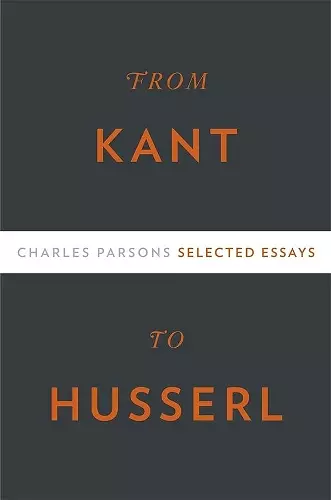From Kant to Husserl
Selected Essays
Format:Hardback
Publisher:Harvard University Press
Published:14th Apr '12
Currently unavailable, and unfortunately no date known when it will be back

Charles Parsons is the master of historically oriented philosophy of mathematics, and his writings have done much to illuminate the historical figures he treats-especially Kant-well beyond their views on mathematics in particular. This volume brings together Parsons's later writings on Kant (appearing after 1980), and includes essays on Frege, Brentano, and Husserl as well. The result is a deeply insightful contribution to our understanding of one central strand in the development of philosophy from the late eighteenth to the early twentieth century. -- Michael Friedman, Stanford University Parsons's penetrating and careful exploration of fundamental issues in the philosophy of mathematics has led him to study in depth key figures in late nineteenth and early twentieth-century philosophy, notably Kant, Frege, Brentano, and Husserl. These essays combine subtle and original insights with a unified view on key topics beyond the philosophy of mathematics. Even those of us who without delay read everything that Parsons writes appreciate having these essays collected between two covers and provided with postscripts on recent developments. -- Dagfinn Follesdal, Stanford University This welcome collection includes valuable essays that have been neglected or are difficult to find elsewhere; it is a great service to bring them together. As always, Parsons's reflections are careful, incisive, rich in insight, and worthy of multiple readings. A wide range of philosophers will reach for this volume repeatedly. -- Daniel Sutherland, University of Illinois
In From Kant to Husserl, Charles Parsons examines a wide range of historical opinion on philosophical questions from mathematics to phenomenology. Amplifying his early ideas on Kant’s philosophy of arithmetic, the author then turns to reflections on Frege, Brentano, and Husserl.
In From Kant to Husserl, Charles Parsons examines a wide range of historical opinion on philosophical questions, from mathematics to phenomenology. Amplifying his early ideas on Kant’s philosophy of arithmetic, Parsons uses Kant’s lectures on metaphysics to explore how his arithmetical concepts relate to the categories. He then turns to early reactions by two immediate successors of Kant, Johann Schultz and Bernard Bolzano, to shed light on disputed questions regarding interpretation of Kant’s philosophy of mathematics. Interested, as well, in what Kant meant by “pure natural science,” Parsons considers the relationship between the first Critique and the Metaphysical Foundations of Natural Science. His commentary on Kant’s Transcendental Aesthetic departs from mathematics to engage the vexed question of what it tells about the meaning of Kant’s transcendental idealism.
Proceeding on to phenomenology, Parsons examines Frege’s evolving idea of extensions, his attitude toward set theory, and his correspondence, particularly exchanges with Russell and Husserl. An essay on Brentano brings out, in the case of judgment, an alternative to the now standard Fregean view of negation, and, on truth, alternatives to the traditional correspondence view that are still discussed today. Ending with the question of why Husserl did not take the “linguistic turn,” a final essay included here marks the only article-length discussion of Husserl Parsons has ever written, despite a long-standing engagement with this philosopher.
By exhibiting the continuity from Kant to classic debates of the early twentieth century and his own investigation of structuralism, Parsons shows how modern developments do not just give rise to new questions, but illuminate issues whose interest and importance is not localized to a formal setting. This is what I find most exciting about his work. -- Katherine Dunlop * Notre Dame Philosophical Reviews *
Charles Parsons is the master of historically oriented philosophy of mathematics, and his writings have done much to illuminate the historical figures he treats—especially Kant—well beyond their views on mathematics in particular. This volume brings together Parsons’s later writings on Kant (appearing after 1980), and includes essays on Frege, Brentano, and Husserl as well. The result is a deeply insightful contribution to our understanding of one central strand in the development of philosophy from the late eighteenth to the early twentieth century. -- Michael Friedman, Stanford University
Parsons’s penetrating and careful exploration of fundamental issues in the philosophy of mathematics has led him to study in depth key figures in late nineteenth and early twentieth-century philosophy, notably Kant, Frege, Brentano, and Husserl. These essays combine subtle and original insights with a unified view on key topics beyond the philosophy of mathematics. Even those of us who without delay read everything that Parsons writes appreciate having these essays collected between two covers and provided with postscripts on recent developments. -- Dagfinn Føllesdal, Stanford University
This welcome collection includes valuable essays that have been neglected or are difficult to find elsewhere; it is a great service to bring them together. As always, Parsons’s reflections are careful, incisive, rich in insight, and worthy of multiple readings. A wide range of philosophers will reach for this volume repeatedly. -- Daniel Sutherland, University of Illinois
ISBN: 9780674048539
Dimensions: unknown
Weight: unknown
256 pages